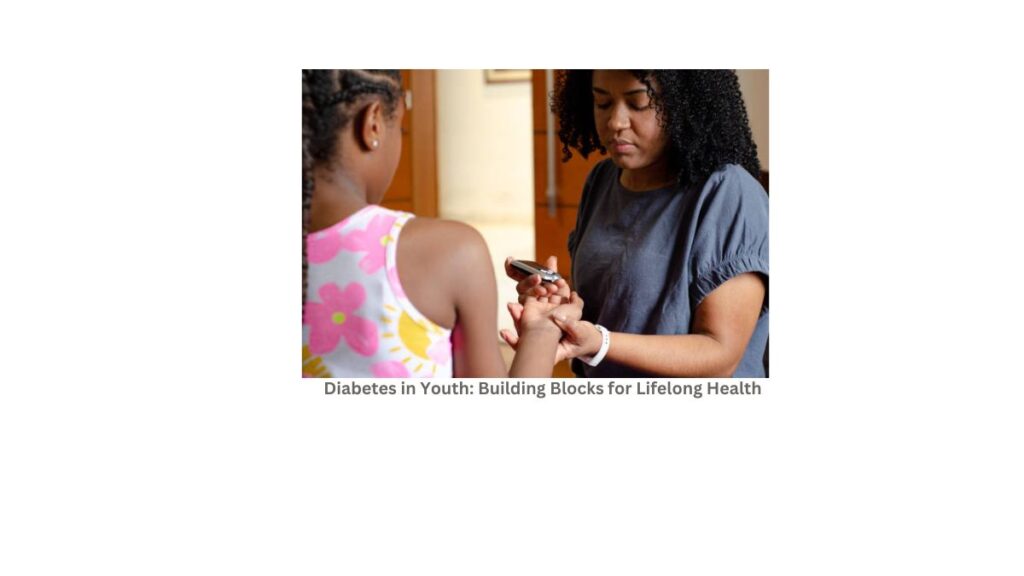Introduction:-
Diabetes in Youth: Building Blocks for Lifelong Health

Diabetes is a challenging condition, especially when it strikes in youth. However, with the right approach and understanding, it’s possible to lay down the foundation for a lifetime of good health. In this article, we’ll explore the essential building blocks young individuals with diabetes can implement to secure lifelong wellness.
1.Understanding Diabetes in Youth
It’s crucial to comprehend the unique aspects of diabetes when it occurs at a young age. From type 1 to type 2 diabetes, each comes with its own set of challenges and management strategies. By understanding the condition thoroughly, individuals can better navigate their health journey.
- Embracing a Balanced Diet:
Nutrition plays a pivotal role in managing diabetes. Encourage young individuals to adopt a balanced diet rich in whole grains, lean proteins, fruits, and vegetables. Emphasize portion control and mindful eating to help stabilize blood sugar levels and promote overall health.
- Regular Physical Activity:
Exercise is not only beneficial for physical health but also for managing diabetes effectively. Encourage youth to engage in regular physical activity, whether it’s through sports, gym workouts, or outdoor activities. Even small increments of movement throughout the day can make a significant difference in blood sugar control.
- Monitoring Blood Sugar Levels:
Regular monitoring of blood sugar levels is essential for managing diabetes. Teach young individuals how to use glucose meters and interpret their results. Stress the importance of keeping track of blood sugar levels to identify patterns and make necessary adjustments to their treatment plan.
- Building a Strong Support System:
Living with diabetes can be challenging, but having a strong support system can make all the difference. Encourage youth to connect with family, friends, healthcare providers, and support groups for guidance, encouragement, and understanding.
- Educating Others:
Empower young individuals with diabetes to educate those around them about the condition. By raising awareness and dispelling myths, they can foster a supportive environment and combat stigma associated with diabetes.
- Prioritizing Self-Care:
Managing diabetes requires diligent self-care practices. Encourage youth to prioritize self-care activities such as getting enough sleep, managing stress, and taking time for relaxation and hobbies. Emphasize the importance of self-care in maintaining overall well-being.
- Staying Up-to-Date with Medical Care:
Regular medical check-ups are essential for monitoring diabetes and preventing complications. Encourage youth to stay up-to-date with their medical appointments, vaccinations, and screenings. Stress the importance of open communication with healthcare providers to address any concerns or changes in their condition promptly.
What can be the reasons for diabetes at a young age?
Diabetes at a young age, particularly type 1 diabetes, often occurs due to autoimmune factors, genetic predisposition, or a combination of both. Here are some reasons for diabetes at a young age:

- Genetic Predisposition: A family history of diabetes can significantly increase the risk of developing the condition at a young age. Certain genetic factors may make individuals more susceptible to autoimmune attacks on the pancreas (type 1 diabetes) or insulin resistance (type 2 diabetes).
- Autoimmune Factors: Type 1 diabetes is primarily an autoimmune condition where the immune system mistakenly attacks and destroys insulin-producing beta cells in the pancreas. This process can occur at any age, but it often manifests during childhood or adolescence.
- Environmental Triggers: Environmental factors such as viral infections or exposure to certain toxins may trigger the autoimmune response leading to type 1 diabetes in genetically predisposed individuals.
- Lifestyle Factors: While type 1 diabetes is not directly caused by lifestyle factors, certain lifestyle habits may contribute to the development of type 2 diabetes in youth. These include poor diet, sedentary lifestyle, obesity, and lack of physical activity.
- Maternal Factors: In some cases, maternal factors during pregnancy can influence the risk of diabetes in offspring. Gestational diabetes during pregnancy, maternal obesity, and certain maternal health conditions may increase the likelihood of the child developing diabetes later in life.
- Early Childhood Exposures: Exposures to certain dietary factors or infections during early childhood may also influence the risk of developing diabetes. Breastfeeding and the timing of introduction to solid foods may play a role in the development of type 1 diabetes.
- Medical Conditions: Certain medical conditions such as cystic fibrosis and autoimmune disorders like autoimmune thyroid disease or celiac disease may increase the risk of diabetes in youth.
- Ethnicity: Some ethnic groups have a higher prevalence of diabetes at a young age. For example, individuals of African, Hispanic, Asian, or Native American descent may have an increased risk of type 2 diabetes due to genetic and lifestyle factors.
It’s important to note that while these factors contribute to the risk of diabetes, not everyone with these risk factors will develop the condition. Additionally, the exact cause of diabetes in each individual may vary, and further research is needed to fully understand the complex interplay of genetic, environmental, and lifestyle factors involved.
Can diabetes be cured in young age?
There is no cure for diabetes, regardless of age. However, with proper management and lifestyle changes, individuals with diabetes, including those diagnosed at a young age, can lead healthy and fulfilling lives.

Type 1 diabetes, which often presents in childhood or adolescence, is an autoimmune condition where the body’s immune system attacks and destroys insulin-producing beta cells in the pancreas. Since the body cannot produce insulin on its own, individuals with type 1 diabetes require lifelong insulin therapy to manage their blood sugar levels.
Type 2 diabetes, which is more common in adults but increasingly diagnosed in youth due to rising obesity rates and sedentary lifestyles, is characterized by insulin resistance and impaired insulin production. While type 2 diabetes may be managed initially through lifestyle changes such as diet and exercise, many individuals may eventually require oral medications or insulin therapy to control their blood sugar levels.
While there is no cure for diabetes, ongoing research is exploring potential treatments and approaches to better manage the condition. Some experimental therapies, such as pancreatic islet cell transplantation and immunotherapy, show promise in restoring insulin production or modulating the immune system’s response in type 1 diabetes. However, these treatments are still in the experimental stage and not widely available.
It’s essential for individuals with diabetes, regardless of age, to work closely with their healthcare team to develop a comprehensive management plan that includes monitoring blood sugar levels, adhering to medication or insulin therapy as prescribed, adopting a healthy lifestyle, and managing any associated health conditions. With proper management, individuals with diabetes can minimize complications and maintain a good quality of life.
Conclusion:
Managing diabetes in youth requires a proactive approach and a commitment to lifelong health. By embracing these building blocks – from proper nutrition and regular exercise to self-care and medical management – young individuals with diabetes can lay the groundwork for a healthy and fulfilling life ahead. With the right support and guidance, they can navigate the challenges of diabetes with confidence and resilience.





